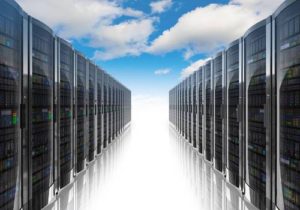We are living in a time where privacy isn’t just a top concern in our personal lives. It’s also more important than ever for our businesses. We’ve all encountered enough nightmare scenarios in the news to know that our data security is constantly at risk. Cloud security, especially where ERP software systems and applications are concerned, has become perhaps the hottest topic in the tech world.
Moving to a cloud future

Since Dropbox launched its cloud service in 2007, the fascination with data storage, and data protection that accompanies it, has occupied the ways we talk about information.
The advantages of the cloud have been well-documented. Quentin Hardy, writing in the New York Times, summarizes the efficiency benefits of cloud computing: “When workloads are shared, computers can run closer to full capacity, with several programs going at the same time. It’s much more efficient than stand-alone computers running one job at a time.”
And it’s not just about efficiency. The cloud is more agile, less intrusive, and allows for remote and field service work opportunities that ever existed before it.
It’s also more secure.
Kasey Panetta writes in Gartner that “through 2020, public cloud infrastructure as a service (IaaS) workloads will suffer at least 60% fewer security incidents than those in traditional data centers.”
Why are businesses still worried about cloud security?

Despite the facts, plenty of businesses still have concerns about their data security and privacy in the cloud. A basic understanding of what the cloud is (namely, a network of remote servers) could make people think their data isn’t safe.
If before, a company’s data was stored on its own server and computer, that method provided the illusion of control. In other words, if the data is in “your house,” no one is going to steal it. Alternately, some people feel that having someone else store their data makes it more vulnerable.
All of this makes logical sense… until you realize that you trust banks with your money instead of stuffing it all inside your mattress.
In the same way that banks have tighter security measures and offer more protection to customers, the operators of cloud servers have the same obligations to users. It’s a simple concept: with more people and more data comes the need for more protection.
A safer user = a safer ERP cloud experience
When it comes to data security in the cloud, it’s less a question of whether data stored in the cloud is protected. It’s actually a question of how people use the cloud. In most cases, the best ERP software systems will have layers upon layers of redundancy and security measures in place.

Did you know that the most security breaches and problems with data protection are the results of user error?
It’s true. Jay Heiser, Research VP at Gartner, notes that “through 2022, at least 99% of cloud security failures will be the customer’s fault.” A harsh assessment, certainly. But also one that can be prevented with simple training and education.
More cloud users should understand the importance of password length (aka “passphrase”). Organizations should employ multi-factor authentication measures and make sure they restrict sensitive data from employees who don’t need it. When companies use and train on IT security best practices, they maximize the data protection within their cloud solution.
Conclusion
Information stored in the cloud isn’t just safer and smarter. It’s also becoming more necessary. As cloud services edge out traditional data storage models, businesses that don’t make the transition will be left with legacy technologies.
While cloud security is the safest choice for any business who has the forward-thinking ability to understand its necessity, choosing a cloud host is just as important. When you’re looking for solutions, make sure you evaluate the security standards of any cloud host. If full documentation isn’t available on the website, go ahead and request it.
The cloud isn’t the future of business anymore. It’s the present. There are many software products out there that can help your business run better. Within that field, there’s really only one direction in which you need to look.

